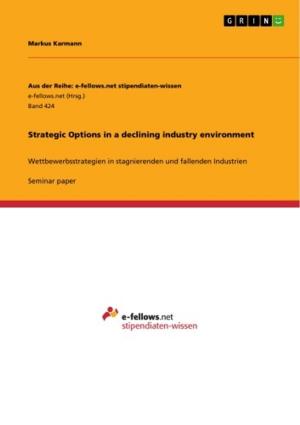| Author: | Christoph Brauß | ISBN: | 9783638566629 |
| Publisher: | GRIN Publishing | Publication: | November 7, 2006 |
| Imprint: | GRIN Publishing | Language: | English |
| Author: | Christoph Brauß |
| ISBN: | 9783638566629 |
| Publisher: | GRIN Publishing |
| Publication: | November 7, 2006 |
| Imprint: | GRIN Publishing |
| Language: | English |
Essay from the year 2005 in the subject Business economics - Business Management, Corporate Governance, grade: 66, University of Glamorgan, course: M.Sc Studium, 14 entries in the bibliography, language: English, abstract: Managing people is one of the challenging tanks in a company. But management has many interpretations and differs from one manager to another. It is important for a company to fill the key positions with managers with social and human skills, technical competence and with the ability to assert oneself (Cuban, 1996). Also understanding of motivation and group influencing is a required ability of an effective manager. So far, the style of management influences employee's behaviour and attitudes (Mullins, 2002). In combination with managing people the term motivation is often used to improve organisations and its performance. To understand motivation, management has to understand the human natural itself, whatever the nature of a person is simple or complex. A lot of competing theories try to analyse the motivation at work, but each individual has its own needs and expectations (Anonymous, 2004). The driving force between an organisation and its members is the concept of motivation. Employee's goals and the company's objectives have to be in balance. The understanding of peoples needs, fears, dreams and expectations and what their true motivation is, is the key problem, a company and its managers are faced with (Cuban, 1996). The aim of this assignment is not to discuss different approaches of motivation but rather to show what the right implementation of motivation by managers and the company itself can influence and improve in special fields (description of the company in Appendix A).
Essay from the year 2005 in the subject Business economics - Business Management, Corporate Governance, grade: 66, University of Glamorgan, course: M.Sc Studium, 14 entries in the bibliography, language: English, abstract: Managing people is one of the challenging tanks in a company. But management has many interpretations and differs from one manager to another. It is important for a company to fill the key positions with managers with social and human skills, technical competence and with the ability to assert oneself (Cuban, 1996). Also understanding of motivation and group influencing is a required ability of an effective manager. So far, the style of management influences employee's behaviour and attitudes (Mullins, 2002). In combination with managing people the term motivation is often used to improve organisations and its performance. To understand motivation, management has to understand the human natural itself, whatever the nature of a person is simple or complex. A lot of competing theories try to analyse the motivation at work, but each individual has its own needs and expectations (Anonymous, 2004). The driving force between an organisation and its members is the concept of motivation. Employee's goals and the company's objectives have to be in balance. The understanding of peoples needs, fears, dreams and expectations and what their true motivation is, is the key problem, a company and its managers are faced with (Cuban, 1996). The aim of this assignment is not to discuss different approaches of motivation but rather to show what the right implementation of motivation by managers and the company itself can influence and improve in special fields (description of the company in Appendix A).















